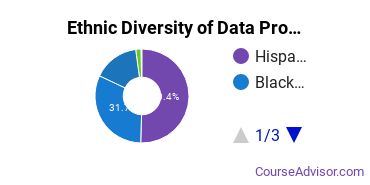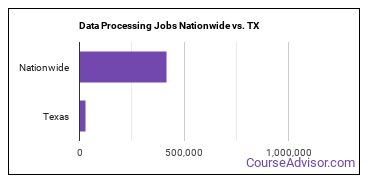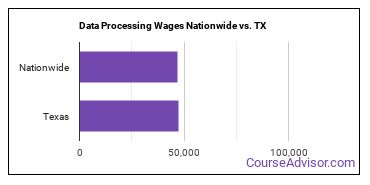Data Processing Schools in Texas
In 2022-2023, 378 students earned their Data Processing degrees in TX.
In this state, Data Processing is the 207th most popular major out of a total 321 majors commonly available.
Featured Data Processing Programs
Learn about start dates, transferring credits, availability of financial aid, and more by contacting the universities below.
BS in Information Technologies - Data Analytics
Learn to leverage data and develop innovative practices, products and processes with this specialized online bachelor's from Southern New Hampshire University.
BS in Computer Science - Data Analysis
Build structured databases, explore big data and learn how to clean data in Southern New Hampshire University's online bachelor's in computer science with a concentration in data analysis.
Featured Data Processing Programs
Learn about start dates, transferring credits, availability of financial aid, and more by contacting the universities below.
BS in Information Technologies - Data Analytics
Learn to leverage data and develop innovative practices, products and processes with this specialized online bachelor's from Southern New Hampshire University.
BS in Computer Science - Data Analysis
Build structured databases, explore big data and learn how to clean data in Southern New Hampshire University's online bachelor's in computer science with a concentration in data analysis.
Education Levels of Data Processing Majors in Texas
Data Processing majors in the state tend to have the following degree levels:
| Education Level | Number of Grads |
|---|---|
| Award Taking Less Than 1 Year | 274 |
| Associate Degree | 72 |
| Award Taking 1 to 2 Years | 32 |
| Award Taking 2 to 4 Years | 32 |
Gender Distribution
In Texas, a data processing major is more popular with men than with women.

Racial Distribution
The racial distribution of data processing majors in Texas is as follows:
- Asian: 4.0%
- Black or African American: 21.7%
- Hispanic or Latino: 54.8%
- White: 16.4%
- Non-Resident Alien: 0.0%
- Other Races: 3.2%

Jobs for Data Processing Grads in Texas
In this state, there are 28,770 people employed in jobs related to a data processing degree, compared to 416,080 nationwide.

Wages for Data Processing Jobs in Texas
Data Processing grads earn an average of $47,480 in the state and $46,750 nationwide.

Most Popular Data Processing Programs in TX
There are 3 colleges in Texas that offer data processing degrees. Learn about the most popular 3 below:
The full-time teacher rate is 36%. The student to faculty ratio is 22 to 1. This public college charges it's students an average net price of $2,210.
Request InformationSeeking financial aid? At this school, 100% of students receive it. A typical student attending Lee College will pay a net price of $6,553. Of all the teachers who work at the school, 42% are considered full time.
Request Information35% of the teachers are full time. This public college charges it's students an average net price of $14,221. 84% of students are awarded financial aid at this school.
Request InformationData Processing Careers in TX
Some of the careers data processing majors go into include:
| Job Title | TX Job Growth | TX Median Salary |
|---|---|---|
| Computer Workers | 16% | $88,460 |
Related Majors in Texas
Below are some popular majors in the state that are similar to data processing.
| Major | Annual Graduates in TX |
|---|---|
| Computer Information Systems | 6,529 |
| Computer Science | 1,891 |
| Information Science | 1,787 |
| Information Technology | 1,208 |
| Computer Systems Networking | 425 |
| Computer Programming | 361 |
| Computer Software Applications | 299 |
| Computer Systems Analysis | 239 |
View all majors related to Data Processing
Explore Major by State
Alabama
Arkansas
Connecticut
Florida
Idaho
Iowa
Louisiana
Massachusetts
Mississippi
Nebraska
New Jersey
North Carolina
Oklahoma
Rhode Island
Tennessee
Vermont
West Virginia
View Nationwide Data Processing Report
References
- College Factual
- National Center for Education Statistics
- O*NET Online
- Image Credit: By Kenneth Jensen under License
More about our data sources and methodologies.


